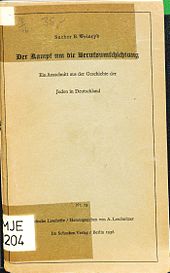Adolf Leschnitzer
Adolf Leschnitzer (born February 3, 1899 in Posen ; died July 24, 1980 in Centerport , New York ) was a German-American German studies scholar and teacher.
Life
Adolf Leschnitzer, son of the pharmacist Oscar and Natalie, b. Fuchs, his younger brother Franz Leschnitzer , later became active in the KPD . He attended the Friedrich-Wilhelms-Gymnasium in Posen and the Kaiserin-Auguste-Gymnasium in Charlottenburg . In 1917 he was called up for military service. From 1918 he studied German literature, history, philosophy and education in Berlin and Heidelberg, where he received his doctorate in 1923. He completed his teacher training traineeship in 1926 with the second state examination and became a teacher in Berlin. He was soon used to train the next generation of teachers and had worked in the fields of German literary history and the methodology of German teaching since the late 1920s.

After the handover of power to the National Socialists , Leo Baeck brought him to the Reich Representation of Jews in Germany as the organizer of the Jewish education system , where he became head of the school department. Lessons had to be organized in 130 schools with 38,000 pupils and the pressing issues of language and emigration had to be included in the curriculum. Leschnitzer had to mediate between the liberals and the Orthodox on the issue of religious instruction and in 1936 he represented the decision for the Sephardic (everyday) pronunciation of Hebrew. Leschnitzer published the Jewish reading books for schools , 29 of which were published between 1934 and November 1938, while Leschnitzer himself wrote booklet 10: Judaism in the Middle Ages .
In 1939 Leschnitzer and his wife, the literary scholar Maria Bratz, emigrated to England and from there in 1940 to the USA, where they founded a language school, the American Institute of Modern Languages. Leschnitzer was from 1950 to 1956 chairman of the "New York Society of Teachers of German". From 1943 he worked for the US Army as a language teacher and as a consultant. In 1945 he wrote the Memorandum An Immediate Program for the Reconstruction of the German School System . Since 1946 he was a language teacher at the City College of New York , where he retired in 1966. Since 1952 he had a visiting professorship at the Free University of Berlin and taught there from 1957 to 1972 as honorary professor of Jewish history and Jewish culture at the "Institute for Jewish Studies". Leschnitzer wrote in New York for the structure , he has published articles in magazines and handbooks. He was one of the founders of the New York Leo Baeck Institute and was a member of the supervisory board there.
In addition to these bread-and-butter jobs, Leschnitzer devoted himself to research into Jewish history, the problem of German-Jewish relationships and anti-Semitism (until 1945) . His book Saul and David revolves around these problems.
Honors
- Bollingen Fellow (1951)
- Fulbright Fellow (1961)
- Federal Cross of Merit on Ribbon (October 22, 1956)
- Honorary doctorate from the Free University of Berlin
Fonts
- The magic background of modern anti-semitism. An analysis of the German-Jewish relationship . New York: International Universities Press, 1956
- Saul and David. The problem of the German-Jewish community . Heidelberg: L. Schneider, 1954
- On Martin Buber's 60th birthday, February 8, 1938: a circular to the Jewish teachers . Berlin: Reich Representation d. Jews in Germany. School Department, [1938]
- Judaism in the world view of Europe. Jewish reading books, 10. Judaism in the Middle Ages . Berlin: Schocken 1935
- Guidelines for Establishing Curriculum for Jewish Elementary Schools . Berlin: Reich Representation d. German Jews, 1934
- Investigations into the "Song of Songs in Minneliedern", a contribution to historical Bible research . Inaugural dissertation - Heidelberg University 1924.
literature
- Monika Richarz : Between Berlin and New York. Adolf Leschnitzer, the first professor for Jewish history in the Federal Republic , in: Jürgen Matthäus , Klaus-Michael Mallmann (ed.): Germans - Jews - Genocide. The Holocaust Past and Present . WBG, Darmstadt 2006, ISBN 3-534-18481-5 .
- Erich Fromm , Hans Herzfeld , Kurt Grossmann (eds.): The peace: idea and realization. Festival ceremony for Adolf Leschnitzer . Schneider, Heidelberg 1961.
- Heinz Steinitz: On the death of Adolf Leschnitzer , structure , August 1, 1980, p. 4.
- Alfred Jospe: Leschnitzer, Adolf. In: New German Biography (NDB). Volume 14, Duncker & Humblot, Berlin 1985, ISBN 3-428-00195-8 , p. 326 f. ( Digitized version ).
- Werner Röder; Herbert A. Strauss , (Ed.): Biographical manual of German-speaking emigration after 1933. Vol. 1: Politics, economy, public life . Saur, Munich 1980, p. 434.
- Joseph Walk : Jewish School and Education in the Third Reich . Hain, Frankfurt am Main 1991.
Web links
- Literature by and about Adolf Leschnitzer in the catalog of the German National Library
- Literature by and about Adolf Leschnitzer in the bibliographic database WorldCat
Individual evidence
- ↑ a b Yakov Sklar: Adolf Leschnitzer , Vita at Leo Baeck Institute , Center for Jewish History 2008
- ↑ Joseph Walk: Jewish School and Education in the Third Reich , 1991, pp. 117f
- ↑ a b Joseph Walk: Jewish School and Education in the Third Reich , 1991, pp. 137f
- ^ Salomon Adler-Rudel : Jewish self-help under the Nazi regime 1933–1939. Mirror of the Reich Representation of the Jews in Germany. Tübingen 1974, p. 40 and passim
- ↑ Office of the Federal President
| personal data | |
|---|---|
| SURNAME | Leschnitzer, Adolf |
| BRIEF DESCRIPTION | German-American German studies specialist and educator |
| DATE OF BIRTH | February 3, 1899 |
| PLACE OF BIRTH | Poses |
| DATE OF DEATH | July 24, 1980 |
| Place of death | Centerport (New York) |